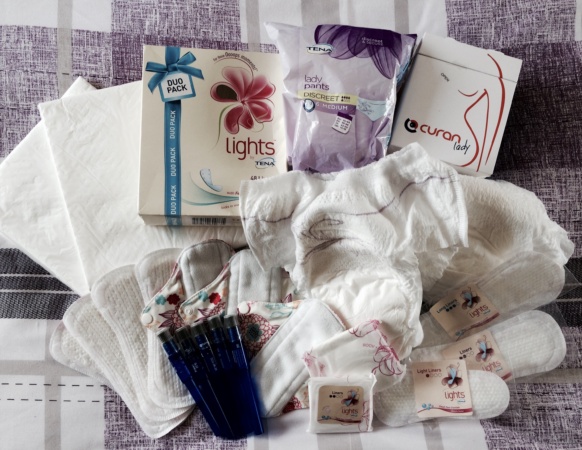We Need To Talk About Incontinence

1 in 3 UK adult women suffers from bladder incontinence. I am 1 of them.
“When I was little, I laughed when my mom crossed her legs when she sneezed…I no longer find that funny.”
– Yet another “hilarious” meme about women wetting themselves trawls across my Facebook feed. I delete it.
When Kate Winslet recently opened up about her bladder incontinence on The Graham Norton Show, women across the county gave a collective sigh of relief and said “Thank you Kate. THANK YOU!”
1 in 3 women over the age of 18 suffers from some form of bladder incontinence in the UK yet, despite being such a common condition, it is still regarded as taboo. The misconception that only elderly people struggle with this issue means it can be very difficult even broaching the subject with your GP when you are young.
My incontinence is caused by a connective tissue disorder called Ehlers Danlos Syndrome. The nerves and muscles in my pelvic area simply don’t work properly. There are times when I’ve had no control at all over both my bladder and bowel; I’ve been fully incontinent. Due to a change in my condition, ironically I now have more problems getting my bladder to empty in the first place. My muscles still don’t function properly so I have a constant little leak from my bladder throughout the day and night. My bowel incontinence is now only an issue when I have a tummy upset. Even so, it’s still hard work day-to-day managing a routine that ensures my bladder doesn’t get too full and my bowel isn’t impacted. I use Curan Lady catheters to empty my bladder a number of times a day and must wear incontinence pads 24/7. I keep pull-ups and bed pads in the house in case my bowel becomes too loose. I even have a number of she-wees (a device that allows women to urinate whilst standing or sitting, without taking their clothes off) in the car for sudden urges. It can feel like my life is dictated by my toileting needs but sticking to a routine has helped me avoid big accidents for a number of years.
The taboo around talking about incontinence makes things much harder for sufferers.
Life for women with incontinence problems would be much easier if it wasn’t seen as such an off-limits conversation. When I first began experiencing bladder accidents, I posted in an online forum for young people with disabilities, asking what others did with their large pads if they had to change in public toilets and there was no bin. The forum administrator contacted me and told me to stop posting about incontinence, that it wasn’t a suitable topic and I was making other people feel uncomfortable. I was devastated. I simply wanted to know I wasn’t the only one dealing with this. I had questions that my incontinence nurse wouldn’t answer. I wanted to know what would happen when I met my future partner; how do I tell them? How on earth would it affect my sex life? I took the hint and stopped talking openly about my incontinence.
Incontinence can be lonely; but I embrace the products and routines that keep me dry.
Since then, I’ve learnt to deal with my bodily (mis)functions alone and to embrace the routines and products that keep me dry. I no longer get embarrassed buying incontinence pads or pull-ups and I often recognise an empathetic “I understand” look from the female cashier as she runs my pads through the till. When Tena brought out their discreet Lady Pants pull-ups, I was delighted. While other women were rushing out to buy the latest designer handbag, I was racing to Boots to stock up on these new pull-ups which didn’t make my bum look triple the size or rustle like a bag of salt and vinegar crisps! Gone were the days where my netty knickers failed to keep my giant NHS incontinence pads in place, leaving them to crawl their way out of my pants to hang freely behind me for all the world to see (it once took 2 hours for me to notice I had grown a very large plastic-backed tail). When I made the switch to Curan Lady catheters, my life finally became much easier. I can now empty my bladder fully in public toilets which means I’m no longer in pain or worried about big leaks when I’m out and about. I’ve also switched to reusable pads to allow my lady-bits some relief from the inevitable soreness that comes from wearing pads 24/7.
Women with incontinence need to know it’s OK to talk; to find out they’re not alone.
Incontinence is not something that just affects post-menopausal women and old ladies. It affects young girls, teenagers, brides-to-be and new mums. It’s time to break the taboo and start talking about how life is done differently when you have a leaky bladder. I’m no longer embarrassed by my paper knickers. I’m proud that I survived my 20s and early 30s, despite feeling like the only women in the world who wee’d herself while watching Countdown. When other women whisper “I leak sometimes”, feeling they have to justify themselves to me, I tell them out-loud: “Me too, it’s ok. I understand.” Let’s stop the whispering, ladies, and start talking properly; talking together to bring better solutions to these issues, more widespread advice and support when it’s needed and – above all – to spread the word that if you’re incontinent you are not alone.
We need to break the taboo surrounding urinary incontinence, people shouldn't be too ashamed to speak out
Share this article:
by Carrie Beckwith Fellows



About the author
Hi I'm Carrie, I live in rural Northumberland. I have complex health issues including severe intestinal dysmotility and bladder dysfunction caused by Ehlers Danlos Syndrome. You can follow my blog at www.ruralteacake.com.



